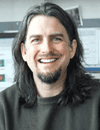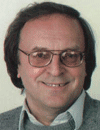Co-Located Conference AgendasAdvances in Automation & Robotics | Advances in Cellular Assays & Cell Culture | Advances in NGS & Big Data | Advances in qPCR and dPCR | High Content Analysis | 

Wednesday, 14 May 201408:00 | Registration | 09:00 |  | Keynote Presentation Solving the Personalized Medicine Puzzle
John Quackenbush, Professor, Dana Farber Cancer Institute, United States of America
The dramatic drop in the cost of genome sequencing has spurred a drive for personalized, precision medicine. But this will require new approaches to integration and interpretation of clinical and genomc data and an understanding of medical decision support requirements. |
| 10:00 | Coffee & Networking in Exhibition Hall | |
Clinical Applications of NGS |
| | 10:45 | Next Generation Diagnostics
Birgit Raddatz, Clinical Laboratory Geneticist, University Medical Center Groningen, Netherlands
Various targeted next generation sequencing (NGS) gene-panels for heterogeneous diseases were designed and implemented into clinical diagnostics that account for the majority of our current requests. The sensitivity and specificity equals Sanger sequencing whereas the diagnostic yield is significantly increased. | 11:30 | Can We Exploit the Power of NGS to Move Towards Personalized Medicine?
Jose Garcia Manteiga, Post Doctoral Fellow, San Raffaele Scientific Institute , Italy
NGS is becoming common place in a clinical environment. Generating data, however, is only the tip of the iceberg. A talk on successes, failures and challenges ahead if we want to turn NGS into the holy grail of "personalized medicine".
| 12:15 | Lunch & Networking in Exhibition Hall | 13:30 | Poster Viewing Session | |
Developments in Sequencing Platforms & Methods |
| | 14:00 |  | Keynote Presentation 3rd and Next Generations for DNA Sequencing: Techniques, Applications
Wilhelm Ansorge, Professor, Ecole Polytechnique Federale de Lausanne, Switzerland
Next generation DNA sequencing techniques are opening fascinating opportunities in life sciences. Commercially available DNA sequencing platforms, Single molecule Real-time methods, Nanopores (also Graphene), Electron Microscopy, as well as other techniques under development are described, and applications in bio-medical fields discussed. |
| 15:00 | Massive Analyses of the Transcriptomes of Single Cells
Joakim Lundeberg, Professor, KTH Royal Institute of Technology, Sweden
We demonstrate the spatial transcriptomics technology, an approach to spatially resolve analysis of gene expression in tissue and cells with the single cell resolution. | 15:45 | Coffee & Networking in Exhibition Hall | |
Applications of Sequencing Data |
| | 16:30 | Exploiting the Patient-specific Tumor Mutanome for Individualized Vaccines for Cancer (IVACs)
John Castle, Co Director, The Institute for Translational Oncology and Immunology, Germany
We are clinically exploiting NGS-determined patient tumor genomes and transcriptomes to make blueprints for “on-demand” productions of individualized vaccines for cancer (IVACs) patients.
| 17:15 | Cause and Consequence of Complex Genomic Rearrangements in Human Disease
Wigard Kloosterman, Assistant Professor, University Medical Center Utrecht, Netherlands
Genomic rearrangements are frequently underlying congenital malformations and cancer. Particularly complex rearrangements, termed chromothripsis, have raised considerable attention. The cause and consequence of these rearrangements will be discussed. | 18:00 | End of Day One |
Thursday, 15 May 2014 |
Applications of Sequencing Data Continued |
| | 08:30 | Signatures of Tumor Clonal Evolution Reveal Novel Driver Genes and Networks in Chronic Lymphocytic Leukemia
Stephan Ossowski, Group Leader, Centre for Genomic Regulation, Spain
Tumors evolve over time and accumulate somatic mutations. Acquisition of alterations conferring a selective growth advantage to neoplastic cells over surrounding normal or tumor cells leads to a rapid increase of the mutated clone within the tumor, resulting in tumor heterogeneity. We have developed a statistical model to exploit signatures of tumor clonal evolution, e.g. cancer cell fraction of somatic mutations, for identification of tumor driver genes and networks. Applying our model to 350 cases of chronic lymphocytic leukemia we identified most known as well as several novel CLL driver genes.
| 09:15 | Big Data Medicine
Hans Lehrach, Head/Professor/Director, Max Planck Institute for Molecular Genetics, Germany
Systems biology approaches and their application in cancer genomics will be presented. Our goal is to make medically relevant predictions from data generated on individual patients for essential steps towards an individualised therapy for cancer and other important diseases.
| 10:00 | Coffee & Networking in Exhibition Hall | |
Big Data in NGS |
| | 10:45 | Big Data in Next Generation Sequencing (NGS): Challenges and Chances
Jurgen Eils, Head, German Cancer Research Centre, Germany
The DKFZ, having equipment of about 15 Illumina Hiseqs and about 10.000 TB data storage, is the leading clinical sequencing center in Europe. Resources and infra-structure requested for performing the leading role will be highlighted but also some accompanying and relevant, but not obvious, aspects as data privacy, data access, policies and others will be commented.
| 11:30 | Management of Genomic Big Data in a Country-wide Collaborative Initiative for Rare Disease Gene Finding.
Joaquin Dopazo, Head, Centro De Investigacion Principe Felipe, Spain
The Medical Genome Project and the Spanish network for Rare Diseases fostered a large-scale sequencing project that involves the analysis of 1000 exomes (more than 800 sequenced to date) to find disease genes in many inherited diseases. | 12:15 | Lunch & Networking in Exhibition Hall | 13:30 | Poster Viewing Session | |
Data Analysis & Bioinformatics |
| | 14:15 | Lessons Learned from Implementing a National Infrastructure in Sweden for Storage and Analysis of Next-generation Sequencing Data
Ola Spjuth, Researcher, Uppsala University, Sweden
UPPNEX is a national e-infrastructure for next-generation sequencing data storage and analysis in Sweden. This presentation features strategic decisions made regarding hardware, software, maintenance and support, resource allocation, and illustrate challenges such as managing data growth in a shared system with over 400 research projects of varying types. | 15:00 | Recent Advancement in Mendelian Genomics and Data Management/Analysis Challenges at the Yale Center for Genome Analysis
Shrikant Mane, Director, Yale Center for Genome Analysis and Keck Proteomics Laboratory, Yale University School of Medicine, United States of America
The presentation will focus on recent discoveries made at YCGA, its computer infrastructure and the current challenges and solutions developed for data analysis and management. | 15:45 | Coffee & Networking in Exhibition Hall | 16:15 | Bacterial Genomic Changes Revealed through Next-generation Sequencing Data Analysis
Lori Snyder, Reader, Kingston University, United Kingdom
Using the Ion Torrent, we investigated the plasticity of the Neisseria gonorrhoeae genome during laboratory culture and analysed sequence differences. We show that elements within the genome are involved in a type of phase variation not previously described. | 17:00 | Close of Conference |
|


 Add to Calendar ▼2014-05-14 00:00:002014-05-15 00:00:00Europe/LondonAdvances in NGS and Big DataAdvances in NGS and Big Data in Barcelona, SpainBarcelona, SpainSELECTBIOenquiries@selectbiosciences.com
Add to Calendar ▼2014-05-14 00:00:002014-05-15 00:00:00Europe/LondonAdvances in NGS and Big DataAdvances in NGS and Big Data in Barcelona, SpainBarcelona, SpainSELECTBIOenquiries@selectbiosciences.com